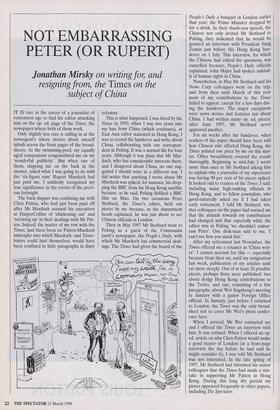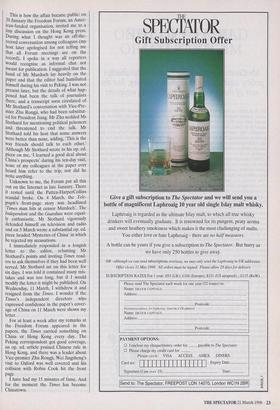NOT EMBARRASSING PETER (OR RUPERT)
Jonathan Mirsky on writing for, and resigning from, the Times on the
subject of China
IT IS rare in the career of a journalist of retirement age to find his editor attacking him on the op. ed. page of the Times, the newspaper where both of them work.
Only slightly less rare is calling in at the newsagent's where stories about oneself splash across the front pages of the broad- sheets. At the swimming-pool, my equally aged companions congratulated me on my `wonderful publicity'. But when one of them, slapping me on the back in the shower, asked what I was going to do with the 'six-figure sum' Rupert Murdoch had just paid me, I suddenly recognised my true significance in the events of the previ- ous fortnight.
The back-slapper was confusing me with Chris Patten, who had just been paid off after Mr Murdoch accused his executives at HarperCollins of 'chickening out' and `screwing up' in their dealings with Mr Pat- ten. Indeed, the matter of my row with the Times, had there been no Patten-Murdoch imbroglio into which Murdoch- and Times- haters could hurl themselves, would have been confined to little paragraphs in diary columns.
This is what happened. I was hired by the Times in 1993, when I was two years into my ban from China (which continues), as East Asia editor stationed in Hong Kong. I was to record the handover and write about China, collaborating with our correspon- dent in Peking. It was a normal life for four years. Although it was plain that Mr Mur- doch, who has considerable interests there, and I disagreed about China, no one sug- gested I should write in a different way. I did notice that anything I wrote about Mr Murdoch was spiked; for instance, his drop- ping the BBC from his Hong Kong satellite because, as he said, Peking disliked a BBC film on Mao. On two occasions Peter Stothard, the Times's editor, held out pieces by me because, as the department heads explained, he was just about to see Chinese officials in London.
Then in May 1997 Mr Stothard went to Peking as a guest of the Communist party's newspaper, the People's Daily, with which Mr Murdoch has commercial deal- ings. The Times had given the board of the People's Daily a banquet in London earlier that year; the Prime Minister dropped by for a drink. In their thank-you speech, the Chinese not only invited Mr Stothard to Peking, they indicated that he would be granted an interview with President Jiang Zemin just before the Hong Kong han- dover on 1 July. This interview, for which the Chinese had edited the questions, was cancelled because, People's Daily officials explained, John Major had spoken unkind- ly of human rights in China.
Nonetheless, in May Mr Stothard and his News Corp colleagues went on the trip, and from then until March of this year most of my contributions to the Times failed to appear, except for a few days dur- ing the handover. The major exceptions were news stories and features not about China. I had written many op. ed. pieces; after June 1997, Mr Stothard never approved another.
For six weeks after the handover, when readers of the paper should have been told how Chinese rule affected Hong Kong, the Times printed one piece by me on this mat- ter. Other broadsheets covered the events thoroughly. Beginning in mid-July I wrote more than once to Mr Stothard asking him to explain why a journalist of my experience was having 90 per cent of his pieces spiked. It looked odd to readers of the Times, I said, including many high-ranking officials in Hong Kong, and to fellow journalists, who good-naturedly asked me if I had taken early retirement. I told Mr Stothard, too, that colleagues on the paper had warned me that the attitude towards my contributions had changed and that especially while the editor was in Peking 'we shouldn't embar- rass Peter'. One desk-man said to me, 'I can't see how you stand this.'
After my retirement last November, the Times offered me a retainer as 'China writ- er'. I cannot account for this — especially because from then on, until my resignation last week, publication of my articles sank yet more steeply. Out of at least 20 possible pieces, perhaps three were published: two about dodgy Hong Kong contributions to the Tories, and one, consisting of a few paragraphs, about Wei Jingsheng's meeting in January with a junior Foreign Office official. In January, just before I returned to London, the Times was the only broad- sheet not to cover Mr Wei's press confer- ence here.
When I arrived, Mr Wei contacted me and I offered the Times an interview with him. It was refused. When I offered an op. ed. article on why Chris Patten would make a good mayor of London (in a front-page interview the day before he had said he might consider it), I was told Mr Stothard was not interested. In the late spring of 1997, Mr Stothard had informed his senior colleagues that the Times had made a mis- take in supporting Mr Patten in Hong Kong. During this long dry period my pieces appeared frequently in other papers, including The Spectator. This is how the affair became public: on 20 January the Freedom Forum, an Amer- ican-funded organisation, invited me to a tiny discussion on the Hong Kong press. During what I thought was an off-the- record conversation among colleagues (my host later apologised for not telling me that all Forum meetings are on the record), I spoke in a way all reporters would recognise as informal chat not meant for publication. I suggested that the hand of Mr Murdoch lay heavily on the paper and that the editor had humiliated himself during his visit to Peking. I was not present later, but the details of what hap- pened had been the talk of journalists there, and a transcript soon circulated of Mr Stothard's conversation with Vice-Pre- mier Zhu Rongji, who had been substitut- ed for President Jiang. Mr Zhu scolded Mr Stothard for mentioning political prisoners and threatened to end the talk. Mr Stothard told his host that some answers were better than none, adding, 'This is the way friends should talk to each other.' Although Mr Stothard wrote in his op. ed, piece on me, 'I learned a good deal about China's prospects' during his ten-day visit, none of my colleagues at the paper ever heard him refer to the trip, nor did he write anything.
Unknown to me, the Forum put all this out on the Internet in late January. There it rested until the Patten-HarperCollins scandal broke. On 4 March, the Tele- graph's front-page story was headlined `Times man hits at censor Murdoch'. The Independent and the Guardian were equal- ly enthusiastic. Mr Stothard vigorously defended himself on television and radio and on 5 March wrote a substantial op. ed. piece headed 'Mysteries of China' in which he rejected my accusations.
I immediately responded in a longish letter to the editor, rebutting Mr Stothard's points and inviting Times read- ers to ask themselves if they had been well served. Mr Stothard sat on this letter for six days. I was told it contained many mis- takes and was too long, but if I would modify the letter it might be published. On Wednesday, 11 March, I withdrew it and resigned from the Times. I wonder if the Times's independent directors who expressed confidence in the paper's cover- age of China on 11 March were shown my letter.
For at least a week after my remarks at the Freedom Forum appeared in the papers, the Times carried something on China or Hong Kong every day. The Peking correspondent got good coverage, an op. ed. article praised Chinese rule in Hong Kong, and there was a leader about Vice-premier Zhu Rongji. Wei Jingsheng's visit to Oxford was well covered and his collision with Robin Cook hit the front page.
I have had my 15 minutes of fame. And for the moment the Times has become Chinatown.





































































 Previous page
Previous page